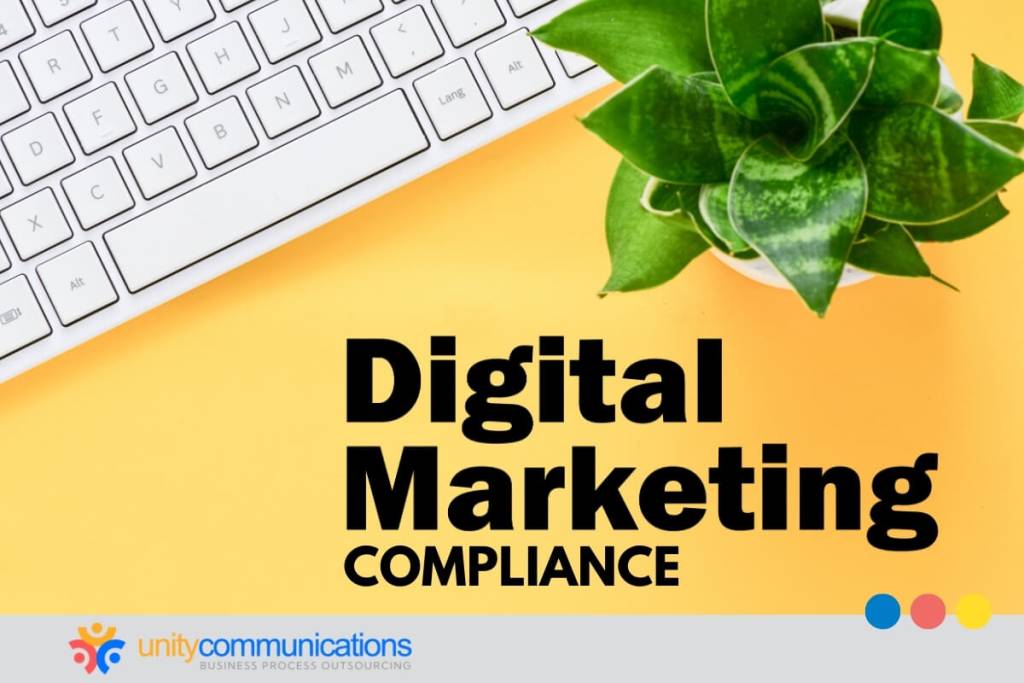IN THIS ARTICLE
Table of Contents
Compliance in digital marketing has become challenging, especially as regulations tighten, digital reach expands, and the landscape evolves. For marketing executives, compliance officers, digital marketing agencies, and business leaders, outsourcing digital marketing compliance offers a solution to secure and scalable growth.
Through business process outsourcing (BPO), companies can tap into specialized expertise and resources to manage data privacy, advertising rules, and international regulatory requirements. With the right BPO partner, businesses can confidently extend their digital presence without compromising compliance.
Keep reading to learn more about the benefits of outsourcing digital marketing compliance.
Understanding outsourcing for digital marketing

What is BPO? It is the practice of contracting non-core business processes to third-party providers, allowing companies to focus on core activities while gaining expert support.
In digital marketing, companies can outsource social media marketing, content creation, search engine optimization (SEO), data analysis, and customer engagement. Delegating these functions to third-party marketing experts can enhance their reach and efficiency without exhausting internal resources.
Compliance is critical in digital marketing outsourcing. Operations must adhere to industry regulations, protect consumer data, and maintain ethical advertising practices. When partnering with a BPO provider, understanding compliance requirements becomes essential to safeguarding brand reputation and avoiding legal pitfalls.
Compliance requirements in digital marketing outsourcing
Ensuring compliance in digital marketing is essential to sustainable success. Companies must be vigilant about data privacy rules, advertising standards, and international marketing practices.
A solid understanding of the following requirements helps businesses maintain compliance while outsourcing digital marketing tasks, from selecting a BPO partner to supervising BPO-managed campaigns.
- Data privacy: Adhere to regulations such as the General Data Protection Regulation (GDPR) and the California Consumer Privacy Act (CCPA) to protect customer information and manage data securely.
- Intellectual property (IP): Properly use copyrighted content, trademarks, and licensed marketing materials.
- Advertising standards: Follow guidelines on truthful advertising, including transparency in promotions, influencer partnerships, and sponsored content.
- Consumer protection laws: Comply with rules safeguarding consumers, such as clear subscription terms, accurate pricing, and fair personal data usage.
- International marketing laws: Be aware of country-specific regulations, especially when targeting audiences across borders. Globally, 74 countries enforce product safety laws, and 76 prioritize consumer education initiatives.
Best practices for managing data security and confidentiality
Managing data security and privacy is critical when outsourcing digital marketing. Sensitive customer information and proprietary data are often shared with external partners. Businesses minimize risks and ensure alignment with data protection standards by implementing robust security protocols.
Companies and their third-party providers must apply these best practices to safeguard data:
- Use advanced encryption methods to protect data full time in transit and at rest so only authorized parties can access it.
- Implement strict access controls and permissions, granting access only to those who need it to perform specific marketing tasks.
- Conduct frequent security audits of internal and external systems to identify and address potential vulnerabilities.
- Require non-disclosure agreements (NDAs) with BPO partners to legally bind them to confidentiality and data protection standards.
- Provide training on data security protocols and compliance requirements to in-house and BPO teams.
Establishing clear communication and reporting mechanisms
Effective communication and reporting are critical in digital marketing outsourcing, especially when ensuring compliance. Companies can align internal teams and BPO staff on objectives, performance metrics, and regulatory requirements through precise mechanisms, reducing non-compliance risk and promoting a competitive advantage.
To support seamless collaboration and compliance, businesses and their BPO partners can utilize advanced tools and processes such as:
- Designating a single point of contact to oversee the project, facilitate continuous communication, and promptly address all compliance matters
- Providing detailed progress reports to highlight project milestones, performance metrics, and compliance challenges, keeping all stakeholders informed and proactive
- Using task management tools such as Asana or Trello to track deadlines, responsibilities, and progress in real time, enabling efficient project oversight.
- Holding regular review meetings to evaluate performance, address concerns, and make adjustments to maintain industry compliance
Aligning strategic objectives with outsourced partners

Aligning digital marketing objectives with BPO partners is crucial for adhering to regulations and protecting brand reputation. Clear communication of marketing goals and compliance standards enables BPO teams to execute strategies that follow data privacy regulations, advertising guidelines, and industry-specific laws.
When internal teams and BPO partners understand compliance, they can work together to create digital marketing campaigns that meet legal requirements and uphold brand integrity.
Businesses focused on this alignment can minimize risks, avoid penalties, and achieve high-quality, compliant digital marketing results.
Here are strategies to align digital marketing compliance objectives with BPO teams:
- Communicate compliance requirements. Companies must highlight data privacy laws, advertising standards, and regional marketing regulations to ensure BPO teams fully understand the legal landscape.
- Train BPO teams on crucial compliance topics. Training must include the latest on the General Data Privacy Regulation (GDPR), the California Consumer Privacy Act (CCPA), and other relevant regulations to deepen their understanding of data protection and ethical marketing practices.
- Establish metrics for compliance adherence. Key performance indicators (KPIs) reinforce accountability and help determine whether marketing efforts align with legal standards.
- Schedule regular meetings to review compliance goals. These meetings address regulation updates and assess whether marketing strategies need adjustment to comply with new or evolving laws.
- Create feedback channels for compliance concerns. Feedback enables internal teams and BPO partners to share insights and resolve potential compliance issues before they affect marketing campaigns.
Scalability and flexibility in outsourced digital marketing
Outsourcing your digital marketing provides scalability and flexibility while complying with evolving regulations. As businesses face dynamic market conditions and increasing compliance requirements, working with an external digital marketing team allows them to adjust their marketing strategies accordingly.
This agility is essential for businesses to remain competitive, protect their brand’s reputation, and mitigate legal risks. Outsourcing in digital marketing facilitates scalability and flexibility through the following:
- Access to a diverse pool of experts: A BPO provider offers a broad network of marketing professionals in SEO, pay-per-click (PPC) ads, content creation, and compliance regulations. Businesses can quickly scale as market needs evolve without compromising quality or compliance.
- Flexible contracts and service offerings: BPO partners provide adaptable agreements, enabling businesses to modify service levels and compliance requirements as priorities change. This flexibility is particularly valuable as new regulations emerge or marketing goals shift.
- Rapid campaign deployment: BPO providers can launch marketing campaigns promptly, ensuring businesses can seize time-sensitive opportunities while adhering to legal and regulatory requirements.
- Cost-effective scaling: Companies outsource to expand their digital marketing efforts without the financial burden of hiring additional in-house staff, reducing overhead costs and staying compliant with labor laws and industry standards.
- Adaptation to niche skills: As the market shifts, businesses can tap into specialized skills to keep digital marketing strategies effective and compliant with ever-changing regulations.
Key performance indicators for monitoring outsourcing effectiveness
To effectively monitor the performance of outsourced digital marketing efforts, it is essential to track KPIs that measure marketing campaigns’ success and alignment with business goals and compliance standards. These KPIs provide valuable insights into how outsourcing affects brand visibility, customer engagement, lead generation, and returns.
By establishing clear KPIs, companies can make data-driven decisions that optimize their digital marketing outsourcing strategies and maximize their investment.
Here are essential KPIs to track:
- Return on investment (ROI) measures the financial returns generated by outsourced digital marketing campaigns, such as social media or email marketing, relative to their costs. This metric indicates the profitability and success of digital marketing initiatives.
- Customer acquisition cost (CAC) calculates the cost of acquiring a new customer through outsourced digital marketing efforts. This helps evaluate the cost-effectiveness of marketing spending in generating new business.
- Conversion rate tracks the percentage of leads that convert into paying customers, offering insights into the effectiveness of the digital marketing funnel and lead quality.
- Engagement rate measures user interactions (clicks, shares, comments, etc.) across digital marketing channels, helping assess how well content resonates with the target audience and aligns with brand messaging.
- Lead generation volume quantifies the number of leads generated through outsourced campaigns, highlighting the effectiveness of marketing strategies in expanding the customer base.
- Campaign timeliness assesses whether outsourced campaigns are delivered on time, ensuring responsiveness to market trends, seasonal opportunities, and compliance with regulatory deadlines.
- Customer satisfaction score (CSAT) measures customer satisfaction through surveys and feedback, providing insight into how outsourced marketing efforts, such as customer engagement or service interactions, meet expectations.
- Compliance adherence tracks the adherence of outsourced marketing efforts to relevant laws and regulations (e.g., GDPR, CCPA, advertising standards) to keep campaigns compliant and reduce the risk of legal issues.
Legal considerations and ensuring agency compliance
Outsourcing digital marketing involves several legal considerations, especially those related to data privacy, intellectual property, and advertising standards. Guaranteeing that the BPO partner adheres to these regulations is crucial to avoid potential legal liabilities and maintain trust with the audience.
By working with an experienced provider, businesses can more effectively navigate the complexities of legal compliance. The following are ways to comply with legal regulations:
- Conducting scheduled audits by the BPO provider helps identify and address regulatory gaps in outsourced processes for long-term security.
- Implementing GDPR, CCPA, and other privacy standards promotes secure and ethical customer data handling.
- Creating well-defined contracts that outline each party’s responsibilities, compliance requirements, and penalties for non-compliance.
- Developing policies on IP rights protects brand assets and maintains the campaign’s authority and compliance.
By prioritizing these measures, businesses can confidently rely on their BPO partners to uphold legal standards in digital marketing.
Risks and mitigation strategies in outsourced digital marketing

Outsourcing digital marketing can present certain risks, including data breaches and regulatory non-compliance. However, with the right strategy in place, BPO providers can help mitigate these risks and ensure the smooth execution of marketing campaigns.
BPO organizations use these risks and mitigation strategies:
- Implementing strong encryption, secure storage, and access controls to prevent long-term data breaches and unauthorized access.
- Keeping BPO teams updated on the latest industry regulations, including data privacy and advertising laws.
- Maintaining open and consistent communication channels to prevent misunderstandings and ensure alignment with security and compliance strategies.
- Conducting due diligence to select reputable and experienced BPO partners with a consistent compliance and quality track record.
- Tracking KPIs and adjusting strategies based on data to prevent breaches and non-adherence.
The role of IP rights in outsourcing
IP rights are critical when outsourcing digital marketing services, as they protect a company’s creative assets, branding, and proprietary information. Clear agreements regarding IP means the business and the BPO partner understand their rights and responsibilities regarding content usage, ownership, and confidentiality.
Proper IP management avoids disputes and safeguards the integrity of marketing efforts. Common practices include the following:
- Specify in contracts who owns the rights to content the BPO team produces, such as graphics, copy, and videos.
- Ensure that third-party content or advanced tools the BPO partner uses are correctly licensed for commercial use.
- Use NDAs to protect confidential information and prevent unauthorized sharing of proprietary materials.
- Outline the use of company logos, trademarks, and branding to prevent misuse or infringement.
- Establish guidelines for creating and distributing copyrighted material to avoid replication or usage without permission.
Future trends in outsourcing and digital marketing compliance
As outsourcing and digital marketing evolve, so do the compliance challenges businesses face. The increasing focus on data protection, consumer rights, and international regulations drives future trends.
Companies must stay ahead of these changes so outsourcing strategies remain practical and legally sound:
- Stricter data privacy regulations: The typical cost of a data breach is $4.88 million. By combining this with stricter GDPR and CCPA standards, businesses are increasingly required to implement stronger data protection measures.
- Artificial intelligence (AI) and automation compliance: In 2023, 37% of marketing and advertising in the U.S. have incorporated generative AI into their work. BPO companies also integrate the technology into digital marketing services. Thus, compliance will extend to ethical AI use, algorithm transparency, and bias prevention.
- Cross-border compliance: With global outreach, businesses will face growing pressure to comply with country-specific regulations, especially advertising and data privacy.
- Increased focus on ethical marketing: Seventy-one percent of customers agree that businesses must take a stand on moral issues. Thus, companies can expect a greater emphasis on transparent advertising practices to keep digital marketing content aligned with ethical standards and consumer protection laws.
- Real-time compliance monitoring: More businesses will adopt real-time monitoring tools to track compliance and quickly address issues arising in outsourced campaigns.
The bottom line

Outsourcing digital marketing compliance is crucial for protecting brand reputation, adhering to regulatory standards, and ensuring secure data handling. Businesses must carefully manage data security, legal requirements, and intellectual property rights while aligning strategic and cultural objectives with BPO partners.
Companies can mitigate risks by following best practices, monitoring KPIs, and driving successful, compliant digital marketing efforts. Learn how your business can navigate these complexities. Let’s connect!





